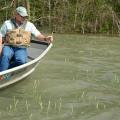Crop Report from 2008
MISSISSIPPI STATE -- Mississippi winter wheat growers should be feeling pretty smart about their planting decisions last fall.
Market prices near $6 per bushel encouraged growers to increase acreage from 370,000 in 2006-2007 to a record 400,000 for this year. Late March prices are near $8 per bushel, but they have been as high as $12.50 per bushel since planting time.
Steve Martin, agricultural economist at Mississippi State University's Delta Research and Extension Center in Stoneville, said several factors are working in favor of strong wheat prices.
MISSISSIPPI STATE -- Mississippi's soybean growers are not alone in their enthusiasm for planting a large crop this year, and the market knows it.
Soybean growers are expected to plant more than 2 million acres in soybeans, the largest state soybean crop since 1998. The national crop, once expected to be near 71 million acres, is now forecast closer to 75 million acres.
VICKSBURG -- Gambling on the river takes on a different meaning every spring for a handful of farmers.
Warren County Extension director John Coccaro said hundreds of acres, some of the county's best cropland, are 10-12 feet under water because of heavy rains well north of Mississippi. Most of the fields were planted in winter wheat last fall when the state was in a seemingly endless drought. Still, the fields have a history of flooding, which makes them too risky for insurance coverage.
MISSISSIPPI STATE -- Freezing temperatures, slugs and crawfish sound more like biblical plagues than problems for Mississippi's early corn. Nevertheless, those are among the challenges growers are reporting to the Mississippi State University Extension Service.
Erick Larson, Extension small grains specialist, said although a mid-April frost likely will cause little damage across much of the state, many other problems are being reported.
MISSISSIPPI STATE -- Few growers remain in the strawberry business in Mississippi, but consumers still like to buy local produce because of its fresh taste.
“It tastes like a strawberry,” said Allen Eubanks, who with his wife, Janice, owns Eubanks Produce in Greene County. “All our strawberries are handpicked, and they are packed, cooled and shipped out the same night. From the time we pick to the time they are in stores is about two days maximum.”
MISSISSIPPI STATE -- Mississippi growers are looking forward to the 2008 rice crop because of news of a potential world rice shortage.
Nathan Buehring, rice specialist at Mississippi State University's Delta Research and Extension Center in Stoneville, said the state's rice acreage has been expanding in recent weeks.
The U.S. Department of Agriculture's initial planting intentions report released March 31 forecast Mississippi's rice acreage to decline about 5 percent from last year.
MISSISSIPPI STATE -- Cotton offers strong profit potential for growers even though it no longer rules as king among the state's row crops.
In 2008, two crops are posting more acreage in Mississippi than cotton's predicted 420,000 acres: soybeans, with 2.05 million acres, and corn, with 670,000 acres. Exceptionally strong markets have lured growers away from their reliable favorite and over to grain crops.
Cotton offers strong profit potential for growers even though it no longer rules as king among the state’s row crops.
May is National Egg Month
By Courtney Coufal
MSU Ag Communications
MISSISSIPPI STATE -- Demand for poultry products remains strong, but high production costs continue to put a strain on producers' pocketbooks.
John Anderson, agricultural economist with the Mississippi State University Extension Service, said production costs have soared to historic levels because of high feed prices and climbing diesel fuel prices.
By Patti Drapala
MSU Ag Communications
MISSISSIPPI STATE -- Weather has been kind to Mississippi's hay and forage producers, but the economy has not.
An unusually cool spring, buffered by adequate rainfall, has increased growth in cool-season forages. Spring is the optimum period for nutrient and sugar content to develop in forages grown for hay, and Mother Nature's timing was good.
MISSISSIPPI STATE -- Dairy farmers would like to celebrate June as dairy month by toasting near-record prices with a glass of cold milk, but they can't afford it.
Bill Herndon, agricultural economist with Mississippi State University's Extension Service, said skyrocketing production costs have more than narrowed the gap between profit and loss; they have eliminated it. At the same time, the price of milk at the grocery story has climbed steadily, averaging near $4.50 per gallon, up from about $2.80 per gallon in 2003, and is expected to remain high through 2009.
MISSISSIPPI STATE -- Mississippi's farmers are beginning the 2008 harvest of 450,000 acres of wheat, the most grown in the state in almost two decades.
In 1990, the state had 600,000 acres of winter wheat, but it was a drastically different time then. Wheat yields averaged 30 bushels per acre, and the 1990 price averaged $3.07 per bushel. At the same time, farm diesel averaged 94 cents per gallon, and urea nitrogen fertilizer was $192 per ton.
MISSISSIPPI STATE -- Farmers know what it's like to roll the dice and hope for good weather, low costs and high profits, but the stakes this year for corn producers are higher than usual.
“Farmers can't afford to have a train wreck with their crop, despite high crop market prices,” said Erick Larson, grain crops agronomist with the Mississippi State University Extension Service. “They are putting so much more into their crop than in years past. One significant hiccup in production could mean the end of their agricultural careers.”
By Patti Drapala
MSU Ag Communications
MISSISSIPPI STATE -- April's cold snap may have slowed watermelon production in Mississippi, but growers are still in great shape to cash in on the Fourth of July.
David Nagel, horticulture specialist with the Mississippi State University Extension Service, said the late spring frost damaged some transplants in the ground at the start of the season. Farmers worked hard to replant those fields and stay on schedule.
“We are seeing watermelons of good quality and size now that harvesting has begun,” Nagel said.
MISSISSIPPI STATE -- Strong market prices and the ability to cope with less moisture than most crops have Mississippi's peanut growers expanding their acreage again this year.
Peanuts have been increasingly popular since the Farm Bill ended the quota system in 2002 and allowed farmers to plant as many acres in peanuts as they wanted.
MISSISSIPPI STATE -- The price of shrimp is up this season, but so is the cost of getting Mississippi's shrimp harvest to market.
The Mississippi harvest began June 17, with early-season wholesale prices up from 10 cents to $2 a pound, depending on size, said David Burrage, professor of marine resources with the Mississippi State University Extension Service in Biloxi.
MISSISSIPPI STATE -- Challenged by rains throughout the planting season, Mississippi's soybeans now face make-or-break conditions as they await uniform showers to complete their growth and fill out beans.
“This crop is later than in recent years because early spring rains kept us from planting much of the crop as early as we would have liked,” said Trey Koger, soybean specialist with Mississippi State University's Extension Service. “We are at a crossroads where we need a rain to keep most of this crop going in the right direction.”
MISSISSIPPI STATE -- The mortgage crisis and high fuel costs are working against timber markets in 2008.
James Henderson, assistant forestry professor with Mississippi State University's Extension Service, said prices for pine pulpwood were increasing early in the year, but higher fuel costs are pressing midyear prices downward, and pine sawtimber prices have been trending downward since the summer of 2007.
By Patti Drapala
MSU Ag Communications
MISSISSIPPI STATE -- The volatile fuel market has caused nightmares for every farmer, but the problem is particularly vexing for sod producers who cannot escape the added cost of looking good.
Sod has to be trimmed and mowed at least twice a week to maintain good appearance and health before sale. Grass practically sells itself when it is luscious and in shape. But these frequent trips with the mower increase fuel use.
By Patti Drapala
MSU Ag Communications
MISSISSIPPI STATE -- Cotton farmers are having a good production year despite a late start, but time is running out for prices to catch up.
Mississippi State University Extension agronomist Darrin Dodds said a wet spring across Mississippi's cotton-growing areas in east Mississippi and the Delta delayed planting.
MISSISSIPPI STATE -- Corn prices were too good to last, and after growing the most expensive corn crop ever, Mississippi farmers are hoping to bring in high enough yields to still make a profit.
John Anderson, agricultural economist with the Mississippi State University Extension Service, said prices have been “melting down” since about mid-July.


